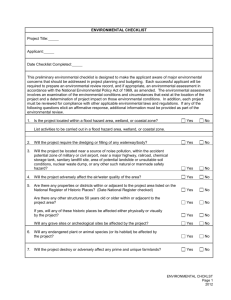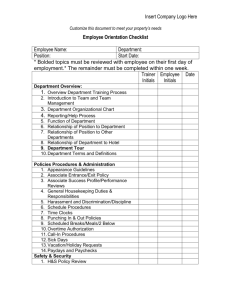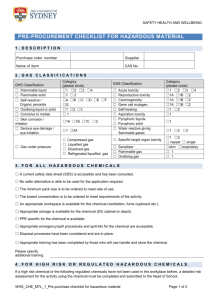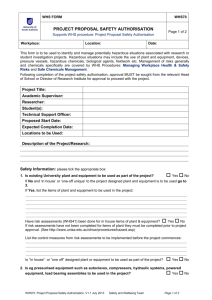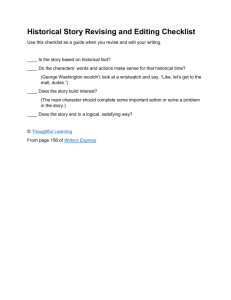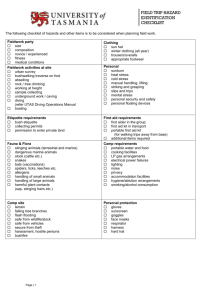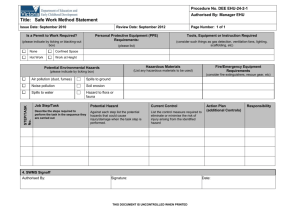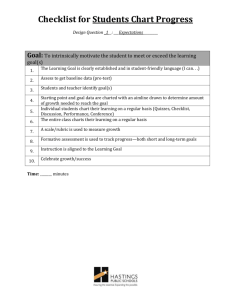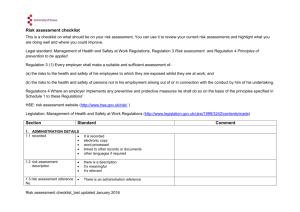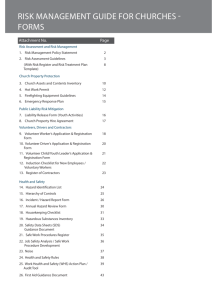WHS Hazard Identification, Risk Assessment Checklist
advertisement
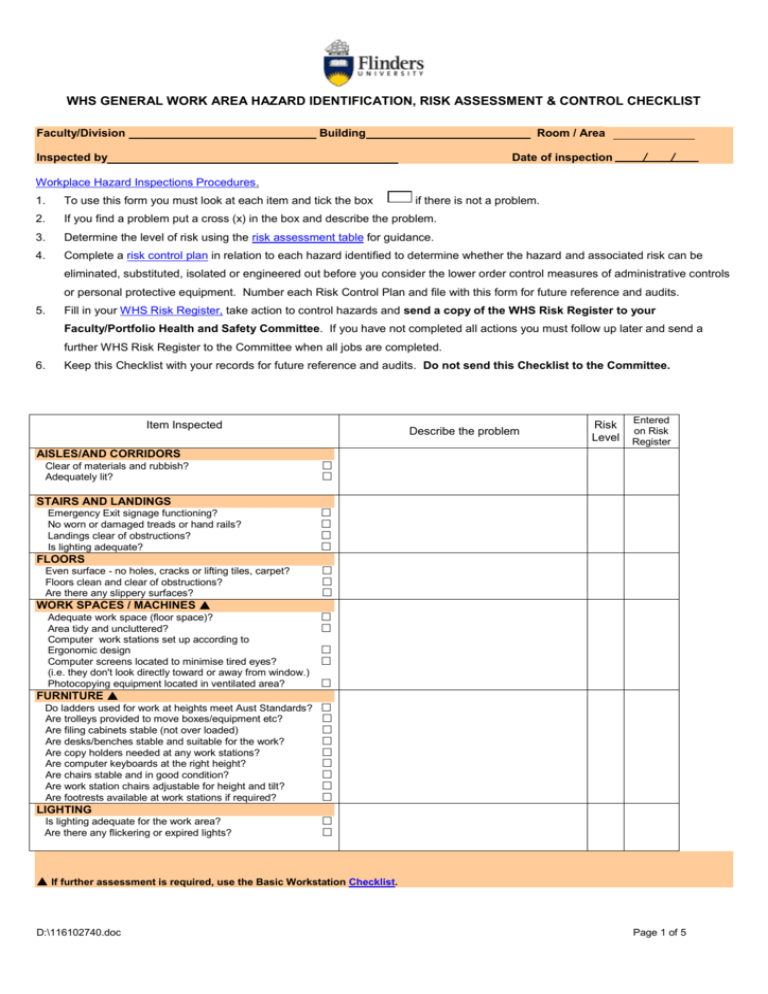
WHS GENERAL WORK AREA HAZARD IDENTIFICATION, RISK ASSESSMENT & CONTROL CHECKLIST Faculty/Division Building Room / Area Inspected by Date of inspection Workplace Hazard Inspections Procedures. 1. To use this form you must look at each item and tick the box if there is not a problem. 2. If you find a problem put a cross (x) in the box and describe the problem. 3. Determine the level of risk using the risk assessment table for guidance. 4. Complete a risk control plan in relation to each hazard identified to determine whether the hazard and associated risk can be eliminated, substituted, isolated or engineered out before you consider the lower order control measures of administrative controls or personal protective equipment. Number each Risk Control Plan and file with this form for future reference and audits. 5. Fill in your WHS Risk Register, take action to control hazards and send a copy of the WHS Risk Register to your Faculty/Portfolio Health and Safety Committee. If you have not completed all actions you must follow up later and send a further WHS Risk Register to the Committee when all jobs are completed. 6. Keep this Checklist with your records for future reference and audits. Do not send this Checklist to the Committee. Item Inspected Describe the problem Risk Level Entered on Risk Register AISLES/AND CORRIDORS Clear of materials and rubbish? Adequately lit? STAIRS AND LANDINGS Emergency Exit signage functioning? No worn or damaged treads or hand rails? Landings clear of obstructions? Is lighting adequate? FLOORS Even surface - no holes, cracks or lifting tiles, carpet? Floors clean and clear of obstructions? Are there any slippery surfaces? WORK SPACES / MACHINES Adequate work space (floor space)? Area tidy and uncluttered? Computer work stations set up according to Ergonomic design Computer screens located to minimise tired eyes? (i.e. they don't look directly toward or away from window.) Photocopying equipment located in ventilated area? FURNITURE Do ladders used for work at heights meet Aust Standards? Are trolleys provided to move boxes/equipment etc? Are filing cabinets stable (not over loaded) Are desks/benches stable and suitable for the work? Are copy holders needed at any work stations? Are computer keyboards at the right height? Are chairs stable and in good condition? Are work station chairs adjustable for height and tilt? Are footrests available at work stations if required? LIGHTING Is lighting adequate for the work area? Are there any flickering or expired lights? If further assessment is required, use the Basic Workstation Checklist. D:\116102740.doc Page 1 of 5 WHS GENERAL WORK AREA HAZARD IDENTIFICATION, RISK ASSESSMENT & CONTROL CHECKLIST Faculty/Division Building Room / Area Inspected by Date of inspection Item Inspected Describe the problem Risk Level Entered on Risk Register STORAGE Storage adequate and convenient and free of rubbish? Bookshelves not overloaded or leaning forward? Are heavy items stored at waist height? ELECTRICAL SAFETY Electrical appliances & leads, tested & tagged and current? No unprotected leads over traffic or access ways? No broken plugs, sockets or switches? No frayed cords? No double adaptors in use? ROOM HEATERS /AIRCONDITIONERS Are heating/cooling units effective for the work area? Are heaters in good working condition? Are heaters situated clear of flammable items? Have bar heaters been replaced with safer heaters? RUBBISH AND RECYCLING Bins emptied regularly? Recyclable materials stored safely? HYGIENE Are emergency numbers (poison etc) displayed? Common rooms clean and tidy? Are food preparation areas clean and hygienic? Are fridges and food storage areas kept clean & hygienic? Adequate drinking, washing facilities, soap and towels? Adequate and clean toilet facilities / supplies? FIRE SAFETY Does the work area have a fire warden? Fire extinguishers been tested, tagged and current? Does area require fire blanket? Are fire, and sprinkler heads clear of obstructions? Clear instructions displayed for evacuation? Adequate direction signs for emergency exits? Access to all fire safety equipment unobstructed? Correct operation of fire doors? Fire doors and emergency exits clear of obstruction? FIRST AID Are First aid signs clearly displayed? Are First aid kits and their contents clean orderly and adequately stocked and not expired? Do kits have contact details for the nearest First Aider and emergency personnel clearly displayed? D:\116102740.doc Page 2 of 5 WHS GENERAL WORK AREA HAZARD IDENTIFICATION, RISK ASSESSMENT & CONTROL CHECKLIST Faculty Building Room /Area Inspected by Date of inspection HAZARDOUS CHEMICAL SAFETY If you are assessing hazards in an office/common room environment please note that where consumer products like dishwashing/cleaning chemicals are used only in ways and quantities consistent with household use and in a way that is incidental to the work carried out by a person, you do not need to list these on a Register, nor undertake a risk assessment or have an SDS available. Name of area Hazardous Chemicals Manager_________________________________________(phone)_______________ If you are assessing hazards in a small laboratory or workshop where chemicals are used all of the Chemical Safety matters on this page should be answered. For larger laboratories and workshops the more comprehensive Legislative Compliance Inspection Checklist compiled by the Faculty of Science and Engineering may be more appropriate to your needs. If you need a copy of the Faculty of Science and Engineering Checklist please contact the WHS Unit. Item Inspected CHEMICAL SAFETY Are all chemicals correctly labeled and stored? Are Safety Data Sheets and Risk Assessments available for all chemicals? Are emergency numbers (poison etc) displayed? Has your area Hazardous Chemicals Manager been notified of discontinued chemicals? Has your area Hazardous Chemicals Manager been notified of new chemicals purchased? Is a copy of your area’s chemical inventory available in the laboratory/workshop? Is there adequate ventilation for fumes and dust? Provision of fume cupboards for testing & analysis? Provision of appropriate personal protective equipment and clothing? Provision of emergency eye wash, antidotes for poisons, showers etc. as appropriate? D:\116102740.doc Risk Any further comments? Level Ask your area Hazardous Chemicals Manager about Safety Data Sheets. Page 3 of 5 WHS GENERAL WORK AREA HAZARD IDENTIFICATION, RISK ASSESSMENT & CONTROL CHECKLIST Hazard Identification / Risk Rating Checklist Using the checklist The checklist is used by inspection teams – the Manager/supervisor/staff. The checklist is used to identify hazards and determine the level of risk of each hazard. If an item is fine, tick the box If an item requires attention place an X in the box Record the level of risk as H (High) M (Medium) or L (Low). Use the table below to determine the level of risk and transfer this information to the Risk Register. Determining the Risk Level You only need to do this for items that need attention. The level of risk is a combination of the Likelihood that the hazard will cause an accident and the probable consequence if it does occur. Ranking Risk Factors by Likelihood Ranking Risk Factors by Consequence Very Likely Expected to occur in most circumstances Fatality May cause death and/or severe irreversible disability, and/or permanent ill health Likely Will probably occur in most circumstances Major Severe injury or illness Possible Might occur occasionally Minor Minor (usually reversible) injury or illness resulting in days off work Unlikely Could happen at some time First Aid First aid level medical treatment Highly Unlikely May happen only in exceptional circumstances Negligible No treatment required Control Hierarchy Likelihood Elimination Remove hazard Substitution Use a less hazardous alternative Eg. Restrict access, use in a closed container, fume cabinet Eg. Trolleys to move loads, guards on machinery, Fume cupboard Eg. Training, Safe Work Procedure, signage Consequence Very likely Likely Possible Unlikely Highly unlikely Fatality Extreme High High High Medium Major injury High High High Medium Medium Minor injury High Medium Medium Medium Medium First aid Medium Medium Medium Low Low Administration Negligible Medium Medium Low Low Low PPE - Personal Protective Equipment Isolation Engineering Eg: Gloves, respirator, safety glasses Prioritising Risks Risk Level Priority Extreme 1 High 2 Medium 3 Low 4 Action The activity should cease immediately and short term safety controls implemented. Notify manager and assess activity. Implement short term safety measures immediately. Notify manager and assess activity. Implement short term safety controls. Notify manager and assess activity. Implement long term safety controls. Notify manager and assess activity. Timeframe for implementation of corrective action Immediate Within 24 hours Within 14 days Within 28 days (if possible) or demonstrate that it is not reasonably practicable to achieve further minimization of the risk See Work Health and Safety Risk Management Policy for further details. D:\116102740.doc Page 4 of 5 WHS GENERAL WORK AREA HAZARD IDENTIFICATION, RISK ASSESSMENT & CONTROL CHECKLIST The next step If you are able to fix the problem please do so and use the “comments” column to indicate that it has been attended to. Fill in your WHS Risk Register, take action to control hazards and send a copy of the WHS Risk Register to your Faculty/Portfolio Health and Safety Committee. If you have not completed all actions you must follow up later and send a further WHS Risk Register to the Committee when all jobs are completed. D:\116102740.doc Page 5 of 5
